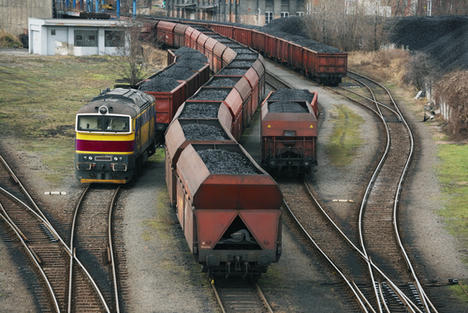Tria Donaldson: Let's leave the dirty business of coal exports behind us
Friday, May 25, 2012

Georgia Straight
By Tria Donaldson
May 25, 2012
As public opposition to tanker traffic on the B.C. coast continues to grow louder, another fossil-fuel industry is quietly moving ahead with its own expansion plans.
Between B.C., Washington, and Oregon, there are proposals for eight brand spanking new coal-export ports, and additional plans to double output at three existing facilities.
These proposals represent a massive increase in our carbon footprint. Once burned, the coal from our fair province’s ports would add over 200 millions tonnes of carbon pollution to the atmosphere every year. Whether used to generate power or as a part of the steelmaking process, the burning of coal for energy is one of the biggest contributors to global warming. B.C.’s growing contribution to this industry represents a dire threat to our collective future.
On Vancouver Island, there are plans for three new coal mines in the Comox Valley and a coal port in Port Alberni. Local opposition has highlighted the impact this proposal would have on drinking water and the Fanny Bay Oyster industry . In the Peace River region of northeastern B.C., critical habitat for the threatened caribou herds that were once plentiful in the region are threatened by new coal mines. The thriving and mighty salmon rivers of the Sacred Headwaters are also at risk from a giant open pit mine proposal. And additional proposals in the Kooteneys will intensify the existing mining activity in the Elk Valley, pushing into intact wilderness.
Most of the coal mined in B.C. is metallurgical coal, used for making steel. But much of the coal shipped through B.C. is thermal coal mined in the Powder River Basin, located in Wyoming and Montana. This coal is destined to be burned for electricity— a dirty, outdated technology. U.S. shipments of thermal coal out of B.C. ports are expected to increase considerably over the next five years, especially as opposition continues to grow in the U.S.
In order to meet the shipping demands of a growing coal industry, industry is planning a massive increase in port capacity, which will mean more marine traffic, more trucks on the road, and more coal trains. Communities along rail routes are concerns about increased traffic congestion and noise. Marine lovers have concerns about the impact that increases in marine traffic will have on wildlife.
The proposed doubling of capacity at Deltaport has quickly become to focal point for opposition to coal exports. The so-called Terminal 2 project could industrialize over 1,000 hectares of agricultural land, and destroy key bird habitats that are part of the Pacific flyway for migratory birds. Additional port capacity would be added at Neptune Terminals in West Vancouver, Pacific Coast Terminals in Port Moody, and Ridley Terminals in Prince Rupert.
Greenhouse gases are only one part of the issue with coal. The toxic legacy of dirty coal is also a huge concern for parents, doctor,s and business leaders.
As more and more coal is dug up, more and more coal trains will be on our rails. And with coal transport comes coal dust, which causes health problems for people with allergies, asthma, chronic bronchitis, emphysema, and heart disease. Seniors and youth are especially at risk.
Coal contains toxic metals like mercury, arsenic, and lead. These are what make coal so toxic when it is burned. Coal trains and trucks add risks to our community, as does the rail diesel, which can trigger asthma and is a known carcinogen.
I have been to many public meetings with coal companies where they say coal dust is no longer an health issue—that it is sealed and immovable. But studies show that for every railcar on a track, up to one pound of coal dust per mile is released. Not a risk I would want for my lungs.
Regardless of the health impacts, which are significant, we literally cannot afford to burn this coal. Our atmosphere cannot handle that coal.
We do have a choice. And people are banding together to say no.
Last week, hundreds gathered in Portland to stand against coal trains. Fourteen people were arrested in Canada, after an act of civil disobedience to stop six coal trains from the U.S. from entering Canada. Over 400 doctors signed on to a statement against coal exports.
Some people try to spin the battle against coal as jobs versus the environment, but it's a fallacy to say it has to be one or the other. We need to build an economy that protects our health, not one that puts it at risk.
As we choose what kind of economy we want, the stakes are high.
What type of jobs are we creating? Jobs of the past, or jobs of the future?
Rather than expanding this harmful and reckless practice, it's time we put exporting coal behind us for good.
Tria Donaldson is the Pacific coast campaigner for the Wilderness Committee. As a youth climate activist, she has been involved with the goBeyond project, the Sierra Youth Coalition, and the Canadian Youth Climate Coalition.